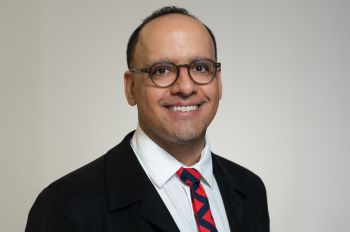It’s Not Your Fault: 2022 Palmer Prize Winner on Privacy in the Information Age

“If you care about human life, you should care about privacy,” says author, lawyer, and professor Neil Richards.
While touring the country promoting his first book, Intellectual Privacy, in 2015, Richards found that people didn’t really want to talk about the book. They wanted to talk about their privacy in general.
“A lot of people have anxiety about privacy, and they have a sort of fatalism about privacy. They see people going to extraordinary lengths to try to do what they can to protect their privacy,” he says. “And it’s impossible for individuals to do that.”
It was on that book tour that Richards found himself in an Uber in California’s Silicon Valley, discussing privacy. His Uber driver chimed in with a simple question.
“There is no privacy anymore, is there?” she asked.
That is when Richards decided to write another book.
Why Privacy Matters was published by Oxford University Press in 2022, and it is the winner of the 2022 Chicago-Kent College of Law Roy C. Palmer Civil Liberties Prize on Democracy, Civil Liberties, and the Rule of Law.
“It’s essential that we have the ability to retain meaningful privacy for things that matter,” he says. “The book is intended to make the case for the continued importance of privacy on the occasion of its supposed death.”
Over the course of 200 pages, Richards breaks down what privacy is, dispels some common myths about privacy, and explains how the law governing our privacy could be strengthened.
Mostly, he makes the case of why privacy is worth fighting for.
“Why does privacy matter? Because information is power, and human information confers power over human beings,” says Richards. “Privacy enables us to manage our personal identities, our political participation, our social relationships, and our economic lives. If we don’t have a meaningful measure of privacy, human life as we know it becomes impossible.”
Richards is the Koch Distinguished Professor in Law and the director of the Cordell Institute at Washington University in St. Louis School. There, he teaches courses on privacy law, which he says, in many cases, is woefully outdated.
“The general rule of American privacy has been ‘notice and choice.’ Since the dawn of the internet, as long as tech companies give us ‘notice and choice’ of their data practices, they are judged to be in compliance with the law,” he writes.
But in real life, he argues, we’re not actually being given real notice or meaningful choices.
“We resign ourselves to hoping it will be OK, and we accept the defaults, and we click through and say we agree and we read the privacy policy, even though we didn’t read the privacy policy,” he says. “Even the lawyers for the companies that are writing the text know that they’re forcing us to lie in order to use these products and services.”
That lie can have devastating consequences on the human psyche, which Richards believes dulls Americans’ desire and ability to fight for their right to privacy by putting the onus on them, making them feel that their lack of control over their data is their own responsibility.
He urges everyone to break out of that thinking.
“That is nonsense. It is a rigged game that is designed to disempower us with respect to our information, to rob us of any semblance of meaningful control or protection in respect to our human information,” he says. “Then to add insult to injury, it’s calculated to make us feel as if it’s somehow our fault.”
He says the responsibility lies with lawmakers and courts, and he offers suggestions for how laws could be strengthened.
“Rather than leave it up to individuals in a state of relative anarchy to try to regulate their own data, what we need are reasonable laws that protect us as consumers, as citizens, and as humans in the digital environments in which we have no choice but to live in the twenty-first century,” he says.
Americans have long been wary of government surveillance, but Richards argues that corporate surveillance of consumers can be just as damaging to democracy.
Richards uses the 2016 Facebook-Cambridge Analytica data scandal to illustrate his point. In that case, United Kingdom-based data firm Cambridge Analytica gathered personal data from millions of Facebook users and created psychological profiles on them. That data was then used to influence voters ahead of the 2016 UK Brexit referendum and the Presidential election in the United States.
“It was a finely honed, big data-based, personalized, political propaganda machine of the sort that we only ever think of as existing in science fiction, but this was real. It was sophisticated and fueled by vast amounts of personal data, a deployment of tools of psychological warfare against two of the oldest and most mature democracies in the world,” says Richards.
Richards argues that as lawmakers debate privacy without making any meaningful policy changes, there’s a lot more than our information at stake.
The very essence of democracy hangs in the balance.
“Politics aside, this is not what democratic deliberation and voting should be about. It shouldn’t be about who has the best data science. Call me naïve, but I think our elections should be about ideas and character and policies and a public conversation about the direction the country should be pursuing,” he says.
Now that the book is published, he’s onto his next project: a model statute for data loyalty, which will hopefully make it easier for politicians to enact legislative changes, along with his third book about the importance of loyalty and trust in our digital society.
“People want to trust. The interesting thing about trust—it’s a positive value, rather than a negative value. Trust is a good, rather than an absence of bad,” he says. “The best way to build trust is to have a duty of loyalty of the sort that lawyers and doctors have to their clients and patients. And giving companies the right incentives to be loyal to us and not betray us just might be the key ingredient to make everyone in our digital society—including them—better off over the long run.”
The Palmer Prize was established in spring 2007 by Roy C. Palmer ’62 and his wife, Susan M. Palmer, to honor a work of scholarship exploring the tension between civil liberties and national security in contemporary American society.
The $10,000 prize is designed to encourage and reward public debate among scholars on current issues affecting the rights of individuals and the responsibilities of governments throughout the world.
Richards delivered a guest lecture at Chicago-Kent on April 12. You can watch it on Chicago-Kent's YouTube channel.



